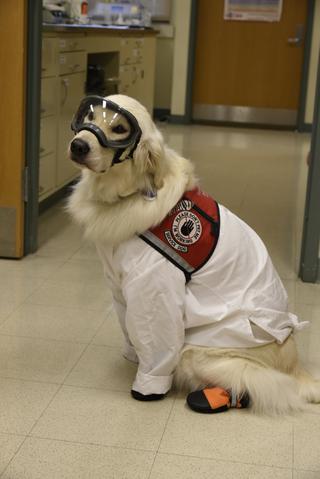Sampson may look like a big ‘ole wiggly bundle of three-year-old golden retriever love -- and he is -- but he is also much more than that: a trailblazer, breaking down barriers in the world of science alongside his owner Joey Ramp.
Twelve years ago, Joey suffered 23 broken bones, a severe brain injury, and permanent nerve damage in a horse accident that left her incapacitated, both physically and mentally. After multiple surgeries, her body started to improve but her mental health continued to suffer, leaving her near rock-bottom. But after learning about service dogs and their ability to work with people suffering from PTSD, Joey decided to take a leap of faith that would land her in the middle of some of our country’s most important science laboratories, with Sampson at her side.
Now 54 years old, Joey is pursuing her second bachelor’s degree in molecular and cellular biology while working in the Rhodes neuroscience lab at the Beckman Institute that’s part of the University of Illinois Champaign-Urbana. She’s studying brain injuries and their link to psychological disorders, hoping to help others avoid the effects of the same PTSD she lives with daily. Helping her through that work is trusty Sampson, the first dog allowed inside the research labs on the university’s campus, and a major reason Joey is able to find such success. Each day while she conducts her experiments, a lab coat, booties, and Rex Specs-clad Sampson stays close, monitoring Joey for signs of stress and anxiety and serving as a physical aid when her chronic pain flares.

Workdays are just as busy for Sampson as they are for Joey. Throughout her daily tasks, he is attentive to her every need, watching for physical cues of Joey’s mental state like rubbing her hands or tapping her finger, which she often does if she’s becoming overwhelmed. When it happens, Sampson will gently nudge her hands or leg to alert her so she can evaluate the situation and then navigate successfully to avoid an escalation of her PTSD symptoms. Joey’s symptoms often include dissociating and becoming non-verbal. He also watches to see when she may need to pick something up off the floor or kneel down, and he’ll spring into action to serve as balance or brace to minimize Joey’s vertigo and nerve pain.
Sampson is a trained service dog, having graduated from the Paws for Independence program, where he spent about a year and a half learning basic service dog skills and obediences and then an additional six months of personalized training with Joey herself to support her life both in and out of the workplace. While his own learning never stops, Sampson’s role has grown to begin his own kind of teaching. He and Joey are working hard to educate decision makers on the importance of access to labs for service dogs, allowing people of all abilities to pursue educations in and contribute to the field of science.
Their work is helping to shape policies and address grey areas that will hopefully end discrimination of service dog handlers in this arena and ensure that people like Joey and dogs like Sampson are able to safely and freely go to work in the lab each day.
For his efforts, Sampson recently won the 2018 AKC Humane Fund Award for Service Dog of the Year, and he and Joey will be flying to Florida next month to receive the honor. He was also named to the top three in the 2018 Hero Dogs awards in the Service Dogs category, and he was featured in October on the Hallmark Channel for the distinction.
VOTE FOR SAMPSON FOR THE 2019 HERO DOG AWARDS
While the accolades are important to shine a light on the important work of this duo, both in and out of the lab, for Sampson what really matters is Joey. And whether he’s TV-famous or not, there’s no doubt that tomorrow he’ll be at her side to monitor for nightmares, hang up her towel after the shower, and gear up for another day at work.


